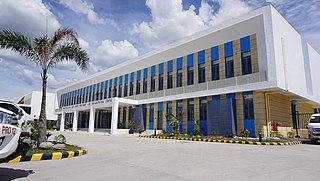
Tranquility Bay was a residential treatment facility affiliated with World Wide Association of Specialty Programs and Schools (WWASPS), located in Calabash Bay, Saint Elizabeth Parish, Jamaica. The facility operated from 1997 to 2009 and received notoriety for its harsh and often abusive treatment of its students, eventually shutting down in 2009 after allegations of child abuse came to light through lawsuits and highly publicized student testimonies.the adolescents reported violence to their parents, only to be ignored.
Alex Koroknay-Palicz is an American activist in Washington, D.C. He is the former executive director of the National Youth Rights Association serving in that post from 2000 till 2012.
A behavior modification facility is a residential educational and treatment institution enrolling adolescents who are perceived as displaying antisocial behavior, in an attempt to alter their conduct.
Mission Mountain School was a therapeutic boarding school for girls located in Condon, Missoula County, Montana. It operated from October 1, 1990, to August 16, 2008. On that date, the school graduated its last class and ceased operation, announcing that its founders would be on sabbatical.

Wilderness therapy, also known as outdoor behavioral healthcare, is a treatment option for behavioral disorders, substance abuse, and mental health issues in adolescents. Patients spend time living outdoors with peers. Reports of abuse, deaths, and lack of research into efficacy have led to controversy, and there is no solid proof of its effectiveness in treating such behavioral disorders, substance abuse, and mental health issues in adolescents.
In the United States, a teen escort company, also called a youth transport firm, is a business that specializes in transporting teenagers from their homes to various facilities.

Aspen Education Group is an American company that provides controversial therapeutic interventions for adolescents and young adults, including wilderness therapy programs, residential treatment centers, therapeutic boarding schools, and weight loss programs, which have been accused of torture and abuse. Since November 2006, Aspen Education Group, with corporate offices located in Cerritos, California has been a division of Bain Capital's CRC Health.
The National Association of Therapeutic Schools and Programs (NATSAP) is a United States trade organization of therapeutic schools, residential treatment programs, wilderness programs, outdoor therapeutic programs, young adult programs, and home-based residential programs for adolescents and young adults with emotional and behavioral difficulties. It was formed in January 1999 by the founders of six programs within the so-called "troubled teen industry," and its board of directors consists of program owners and educational consultants. As of 2021, all but one of those founding six programs have been shut down in the ensuing years for a variety of reasons, including child abuse, neglect, licensing violations, and successful class action lawsuits.

Allynwood Academy, formerly the Family Foundation School, was a private, co-educational, college preparatory, therapeutic boarding school located in Hancock, New York. The school was in operation from 1984 through 2014, when it closed due to declining enrollment amid a raft of physical, emotional, and sexual abuse allegations made by alumni in a grassroots "truth campaign." At least ten lawsuits have been brought by former students since 2019, in which plaintiffs claimed that strip searches, hard labor, isolation rooms, physical restraint, and sexual assault were rampant at the school in the 1990s and 2000s. Three of the lawsuits were settled in October 2021 for undisclosed sums. A front-page New York Times article in 2018 reported a pattern of at least one hundred deaths by overdose and suicide among alumni, the vast majority before age 40.

A residential treatment center (RTC), sometimes called a rehab, is a live-in health care facility providing therapy for substance use disorders, mental illness, or other behavioral problems. Residential treatment may be considered the "last-ditch" approach to treating abnormal psychology or psychopathology.

Élan School was a private, coeducational, and abusive residential behavior modification program and therapeutic boarding school in Poland, Androscoggin County, Maine, US. It was a full member of the National Association of Therapeutic Schools and Programs (NATSAP) and was considered to be a part of the troubled teen industry. The facility was closed down on April 1, 2011, due to reports of abuse, many from former students, dating back to its opening in 1970.
A therapeutic boarding school is a residential school offering therapy for students with emotional or behavioral issues. The National Association of Therapeutic Schools and Programs listed 140 schools and programs as of 2005.

West Ridge Academy, is a youth residential treatment center based in West Jordan, Utah, USA. It seeks to provide clinical services, education, and other programs for teens, both girls and boys, that are identified as at-risk. Until 2005, the Utah Boys Ranch was male-only. In early 2005, it opened new, separate facilities for girls and changed its name to West Ridge Academy. It is a non-profit 501(c)(3) corporation under the name Children and Youth Services, Inc. The academy states that it provides "quality clinical services, education, and experiences which promote spiritual awareness, personal accountability and change of heart." The facility has received criticism for past abusive practices toward residents, including facing lawsuits in 2008, 2010, and 2012 by former students. In 2016, the application to transition West Ridge Academy into a charter school, named Eagle Summit Academy, was approved by the Utah Board of Education after including caveats to keep public and private funding separate in the school's budgets and to ensure the safety of the new charter school's students.

The Alberta Adolescent Recovery Centre, or AARC, is a drug rehabilitation centre for adolescents and family members located in Calgary, Alberta. AARC specializes in treating young people suffering from drug addiction and alcoholism, and takes in clients who have been thought of as being too far-gone for recovery. The AARC program is a multifaceted drug treatment program that uses twelve-step recovery processes, peer pressure, family and group therapy. A survey conducted by AARC found they had an 80% success rate, and that former addicts can permanently abstain from using drugs or alcohol following treatment at the centre. Another study found that the "AARC program is a unique model for comprehensive, long-term adolescent substance use treatment with a high rate of treatment completion (80.5%)."
The Texas Juvenile Justice Department (TJJD) is a state agency in Texas, headquartered in the Braker H Complex in Austin.
Elevations RTC is a residential treatment center in Syracuse, Utah, for teens ages 13–18. The facility was formerly known as Island View Residential Treatment Center until 2014, when it was acquired by Syracuse RTC, LLC, which does business as Elevations RTC. The Elevations campus is shared with Seven Stars and ViewPoint Center.
Shepherd's Hill Academy (SHA) is an accredited and licensed Christian therapeutic boarding school located in Martin, Georgia, United States, that provides year-round residential care and a private school for grades 7 through 12.

Mary Jane Rotheram-Borus is a licensed clinical psychologist and professor with the University of California, Los Angeles, Department of Psychiatry and Biobehavioral Sciences. Rotheram is the professor-in-residence in the Semel Institute for Neuroscience and Human Behavior. She is the Director of the Global Center for Children and Families at UCLA and the former director of the Center for HIV Identification, Prevention, and Treatment Services.
The troubled teen industry is a term used to refer to a broad range of youth residential programs aimed at struggling teenagers. The term encompasses various facilities and programs, including youth residential treatment centers, wilderness programs, boot camps, and therapeutic boarding schools.








